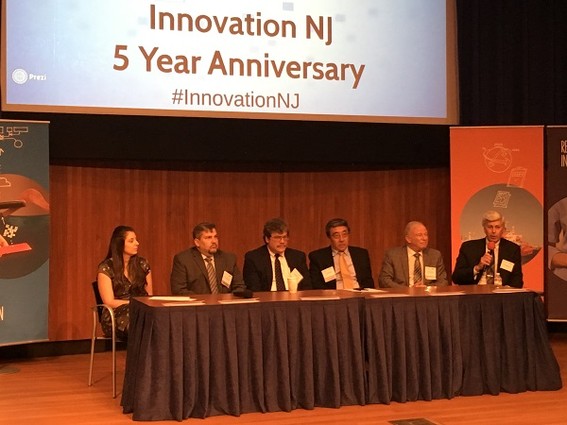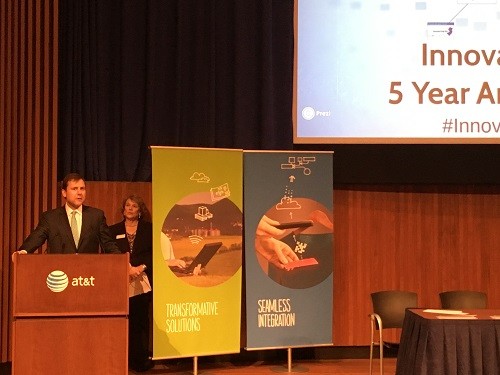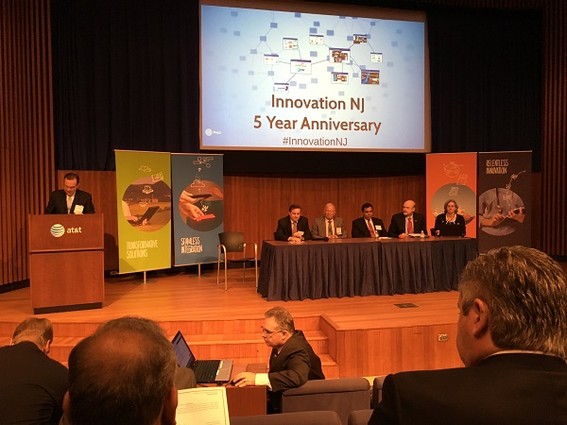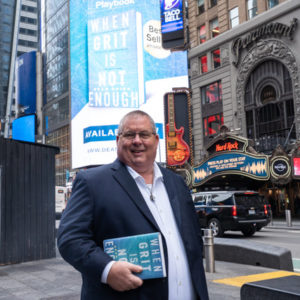InnovationNJ 5th Anniversary Celebration Highlighted NJ’s Accomplishments

[This fall was an extraordinarily busy one for the New Jersey tech scene, and NJTechWeekly.com was overwhelmed by the amount of reporting required for all the events that were going on. As the holidays approach and the event season winds down, we’ll be presenting our coverage of some of those happenings. Here is our story about InnovationNJ.]
On a day when New Jersey was preparing for yet another storm (one that didn’t materialize,) InnovationNJ, a diverse coalition of industry, higher education and government organizations, celebrated its fifth anniversary at AT&T’s New Jersey corporate campus in Bedminster.
Some of the government officials scheduled to participate couldn’t be on hand, as they were preparing for the storm, but Senator Tom Kean Jr. was there to offer some remarks. Introduced by Melanie Willoughby, cofounder of InnovationNJ, Kean said that whenever he encountered engineers or other members of STEM professions during his travels through New Jersey, he found that they were firm in their belief that, no matter what the challenge, human innovation and ingenuity could solve it.

“Certain things can be done with no tax dollars,” he said. “We can create an innovation ecosystem … with people all around the country looking at New Jersey with a more optimistic light.”
Haskell Berman, senior vice president for state affairs at the HealthCare Institute of New Jersey (New Brunswick) and an InnovationNJ cofounder, noted that when InnovationNJ was launched, its goal was to forge a collaboration between New Jersey’s innovative companies and local universities and colleges.
“I think we were a bit surprised from the press coverage of our launch. …We had groups calling us” asking if they could join the coalition. “What we discovered were a lot of groups working in this area, but toiling in their individual silos.” There are now 100 members.
During its five years, the group published two reports, “Building Bridges Between Academic Institutions, Business and Government to Bring Innovation to the Marketplace,” and “Building Bridges II: Breaking Down Barriers; Perspectives from Academia and Industry on Building a New Jersey Innovation Ecosystem.”
“What we were trying to do above all else was change the culture of university engagement with industry,” said Berman. He explained that, as lines of communications opened up, the group continued its efforts to develop an innovation ecosystem in the state.
Later, university and company representatives discussed their collaborations in a first panel moderated by Michele Siekerka, president and CEO of the New Jersey Business & Industry Association (NJBIA). Siekerka highlighted what she called some of the greatest accomplishments in New Jersey during the last five years.
These included the establishment of the Rutgers Biomedical and Health Sciences center; New Jersey Innovation Institute; South Jersey Technology Park, at Rowan University; Big Data Alliance, at Rutgers University; new medical schools at Rowan and Seaton Hall universities; centers of excellence at Montclair State; and a school of pharmacy atFairleigh Dickinson. In addition, Rutgers has joined the Big10 Cancer Research Consortium and is planning the construction of an Innovation Park.
During the discussion, Dr. Kenneth Blank, senior vice president for health sciences at Rowan University, said that his relationship with Lockheed Martin had begun about two years before, but he noted that the university’s relationship with the company went back several years. Robert Regensburgers, project specialist principal at Lockheed Martin for mission systems and training, said that his company’s real collaboration with academia began with a meeting between Lockheed and the leadership of various universities in New Jersey that was arranged by Rochelle Hendricks, the state’s secretary of higher education.
“While you may not think that defense industries are as competitive as industries in the commercial space, they are,” said Regensburgers. “And price is a major determinant now in the outcomes of competitive proposals. So we have embarked on a path of transforming our business.” He added that Lockheed needed a staff that was qualified to participate in the transformation. “We are now operating a series of clinics and other training and educational programs designed to enable Rowan graduates to be ready for work, not just for Lockheed but for other industry demands as well.”
Lockheed has already succeeded with a number of students from Rowan, who continue to serve as interns. The company has also leased space at the South Jersey Technology Park, and has plans to build out a site for radar testing and development. He noted that the company was creating a “research triangle” of sorts, with operations in Camden, Morristown and Glassboro (near Rowan).

Dr. Fernando J. Muzzio of Rutgers spoke about his university’s long-time collaboration with Bristol-Myers Squibb. Some nine years ago, the university was able to fund an engineering research center here in New Jersey that’s also supported by the National Science Foundation. The university reached out to its partners and to big pharma, and created an outcome-focused strategic plan. The center now has 50 dues-paying members, which have contributed more than $10 million, according to Muzzio. “Our funding from the government is declining,” he noted.
Dr. Sam Kiang of Bristol-Myers said that he was very proud of the impact of engineering on the pharmaceutical industry. He noted that the center was “working on a [continuous] manufacturing approach that will revolutionize the manufacturing of pharmaceuticals.” Bristol-Myers and Rutgers have put together a manufacturing line so that they can continue collaborating on this project. The two entities also exchange interns, faculty, students and even senior scientists, he said. “I think that our collaboration has been very successful, and we have trained many students and faculty.”
Tomas Gregorio, a senior executive director at the New Jersey Innovation Institute (NJII), explained that his group at NJII, the Healthcare Innovation Lab, focuses on helping doctors’ offices solve their problems. For instance, the group helps more than 8,000 physicians exchange data. “It’s consulting with a twist, if you will. We are able to provide technology to solve problems.”
He explained that every doctor’s office is a small business that has been “turned on its side” by healthcare reform. It is very important to automate as much as possible, and to provide doctors with the information they need to treat their patients or transfer them within the healthcare ecosystem. He added that NJII had just been awarded $49 million to help 11,000 physicians in New Jersey shift from being paid per visit to being paid for taking care of clusters of patients. The grant will also help doctors solve patient problems while reducing expenses and giving quality care.
“One of the things we are always looking for in the 50 companies in our Enterprise Development Center that are either healthcare or life science companies is how to use the ecosystem we’ve built to solve problems,” said Gregorio. A major issue in healthcare, he added, is transportation. If a patient can’t leave his bed, the hospital can’t fill the bed. If a patient can’t get to the doctor, she could wind up back in the hospital.
“That’s why when MediCoupe came to us we found a unique opportunity , an Uber-like environment to move patients around in a way that is medically appropriate, and can get them to their appointments or their pharmacy or wherever they needed to go.”
Christine Barbieri, cofounder and CEO of MediCoupe (Somerville), said that NJII had been instrumental in getting her company off the ground. In the healthcare field, the stakeholders, executives and decision makers aren’t necessarily the same people, so NJII helped MediCoupe to understand the ins and outs of that ecosystem. NJII also worked with MediCoupe in developing a business model and making its technology functional. Barbieri added that, thanks to NJII, what had been an overwhelming task—providing transportation for those who need it, including older patients not yet willing or prepared to age out of driving—is now achievable, with a clear path forward and a feasible way to scale.
Attendees networked, listened to a second panel discussion on the future of collaboration and innovation, and heard keynote address by Tony Boccanfuso, president of the University Industry Demonstration Partnership.

